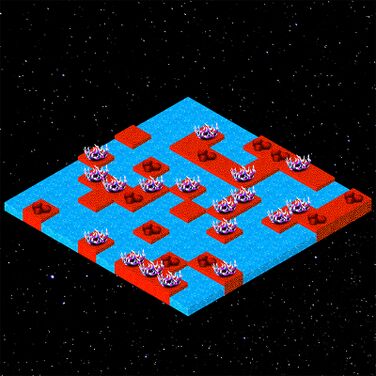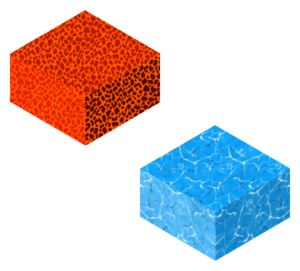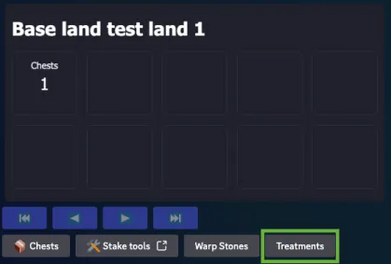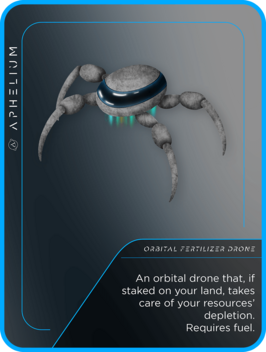Land
In Aphelium, lands aren’t just virtual space; they’re your base for crafting, storing, and even earning! Think of them as special plots that bring benefits and depth to your gameplay. Each of your lands now comes with a chest for additional storage. You can stock up your resources here if you don’t plan to use them right away.
How to Get a Land
Visit the visit the secondary market here.
The Rarities & Their Perks:
- Types of Lands: They range from Common to Legendary, each with its set of advantages.
Even common lands can surprise you with a dash of rare resources. Every plot is unique and packed with potential.
- Unique Characteristics: No two lands are the same. Even among commons, some have a richer resource distribution than others.
- The Luck Factor: You can choose a land from the secondary market with known resources. Or, try your luck with a common land pack — you might discover a particularly resource-rich plot!
The system evolves, with the distribution of resources across lands changing with every generation. Each generation of Aphelium lands brings a different composition. As new lands are introduced, the entire resource pool gets a reshuffle. What does this mean? A common land that you own today, rich in certain resources, could become a hotspot for the rarest of resources in the future, thanks to this dynamic reshuffling.
- Why Go Rare+ then?: Owning rarer lands offers added bonuses like more storage chests, more taxes from the explorations, the ability to rent out for passive income, and exclusive construction options like spaceships in the future.
Composition
The lands are made up of cubes of ground and water placed randomly to form an image of 800x800 pixels. The cubes of ground and water are selected with random percentages to prevent players finding lands with the same ratio. It's currently possible to find land without water, but not land without ground. As for now there is only one aquatic resource, and the absence of land wold prevent construction of ground-based buildings.
Rarities
Each land contains up to 3 resources in random quantities. These will define the rarity level of the land. There are 5 levels of land rarity:
- Common
- Uncommon
- Rare
- Epic
- Legendary
Common: 1 extra chest slot
Uncommon: 2 extra slots
Rare: 3 extra slots (with rental capability)
Epic: 5 extra slots (with rental capability)
Legendary: 10 extra slots (with rental capability)
Common: %10 tax from explorations
Uncommon: %15 tax from explorations
Rare: %20 tax from explorations
Epic: %35 tax from explorations
Legendary: %50 tax from explorations
Generations
Each new generation will be randomly generated in terms of resources and composition. This process will define, from generation to generation, the rarity of the resources and their base value.
This could affect the rarity of the previous generation's lands.
The amount of resources in each generation will be combinated to calculate the scarcity across all the generations. This will adjust rarities and values accordingly.
Examples
1st generation
| x60 lands with wood |
| x40 lands with limonite |
| Limonite would be the rarest resource, with a 1.5x higher value than wood |
2nd generation
| x50 lands with wood |
| x50 lands with limonite |
| Limonite would still be the rarest, with a 1.2x higher value than wood |
3rd generation
| x30 lands with wood |
| x70 lands with limonite |
| Wood would become the rarest, with a 1.14x higher value than limonite |
Land Management
Resource Depletion and Treatment: Understanding the Basics
Natural Depletion: Your land’s resources, such as fruits, crops, mushrooms, and fish, diminish over time. For example, a land with 40% fruitfulness can drop to 30% if not attended to.
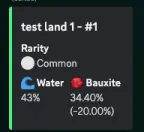
Treatment Requirements: Resources deplete 10% weekly, once a resource is depleted it’s time for treatment. The more the depletion, the more treatments required (e.g., 20% depletion needs two treatments)
Current Penalty — Reduced Resource Production: Unmaintained lands already suffer from reduced resource output. Regular care is essential to keep your lands at peak productivity.
Manual Land Restoration: Weekly Commitment with Specific Treatments
Base Visits: If you have multiple lands, each requires an individual visit to its base.
Treatment Process: Every land has a ‘Treatment’ button for resource maintenance. This needs to be done weekly.
Resource-Specific Treatment Items: Different resources require specific treatment items. Soil might need minerals and nutrients, while fish populations require water enhancers.
Drone-Assisted Restoration: Efficiency and Automation
Staking Drones: By staking drones to your lands, they automatically take over maintenance tasks.Monthly Maintenance Cycle: Unlike the weekly manual approach, drones follow a monthly schedule, reducing the frequency of care required.
Fueling with /fill Command: Drones need monthly refueling with oil crafted from fish. The /fill command lets you refuel all staked drones at once, once you have enough fuel on you.
Simplified Resource Management: With drones, you don’t need to worry about different treatment items for various resources. The drones handle it all, using just the oil as fuel.
Reputation and Friendship Penalties: Neglecting your land will result in a decrease in Reputation and Friendship points. The more your resources deplete, the greater the penalties.
Maximum Penalties: A 50% depletion will incur a maximum penalty of -5 Reputation and -5 Friendship, once a worker or an explorer is on your land.
Seasonal Events: Natural Resource Boosts
Meteor Showers: These rare events, occurring at the start of each season, can naturally boost your land’s resources.
Manual vs. Drone Maintenance
Manual Treatment:
Weekly visits and treatments.
Specific treatment items needed for each resource type.
More hands-on and time/resource consuming.
Resource-Specific Manual Restoration: Weekly Attention for Each Resource Type
For Fish (Mineral Satchel Requirements):
Weekly: 10 Bauxite, 15 Anatase, 5 Limonite, 5 Chrysocolla, and 1 Chromolite.
Monthly: 160 mixed resources and 4 Chromolites.
For Wood (Tree Growth Accelerator Requirements):
Weekly: 20 Bauxite, 10 Anatase, 5 Chrysocolla, 5 Galena, and 1 Chromolite.
Monthly: 160 mixed resources and 4 Chromolites.
For Stone and Other Minerals (Heat-induced Seismic Activities):
To craft: 20 Stones, 20 Wood, and 1 Chromolite.
Monthly: 160 mixed resources and 4 Chromolites.
For Crops, Mushrooms and Fruits:
To craft: 10 Bauxite, 10 Chrysocolla, 5 Galena, 5 Limonite and 1 Chromolite.
Monthly: 160 mixed resources and 4 Chromolites.
Drone Maintenance:
Monthly maintenance with less frequent attention needed.
Unified /fill command for all drones, using oil crafted from fish.
No need to manage different treatment items for each resource.
Fueling Your Drones:
Monthly: 30 fish are required to craft the fuel for the drones.
Notes
The lands and resources are created exclusively for Aphelium and are hand drawn by our graphic designer.
